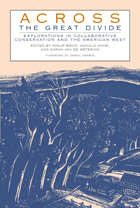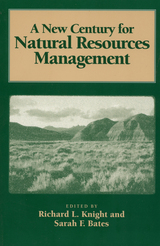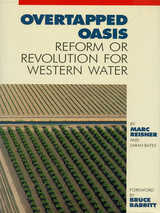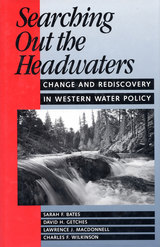
Amid the policy gridlock that characterizes most environmental debates, a new conservation movement has emerged. Known as “collaborative conservation,” it emphasizes local participation, sustainability, and inclusion of the disempowered, and focuses on voluntary compliance and consent rather than legal and regulatory enforcement. Encompassing a wide range of local partnerships and initiatives, it is changing the face of resource management throughout the western United States.
Across the Great Divide presents a thoughtful exploration of this new movement, bringing together writing, reporting, and analysis of collaborative conservation from those directly involved in developing and implementing the approach. Contributors examine:
- the failure of traditional policy approaches
- recent economic and demographic changes that serve as a backdrop for the emergence of the movement
- the merits of, and drawbacks to, collaborative decision-making
- the challenges involved with integrating diverse voices and bringing all sectors of society into the movement
In addition, the book offers in-depth stories of eight noteworthy collaborative initiatives -- including the Quincy Library Group, Montana's Clark Fork River, the Applegate Partnership, and the Malpai Borderlands -- that explore how different groups have organized and acted to implement their goals.
Among the contributors are Ed Marston, George Cameron Coggins, David Getches, Andy Stahl, Maria Varela, Luther Propst, Shirley Solomon, William Riebsame, Cassandra Moseley, Lynn Jungwirth, and others. Across the Great Divide is an important work for anyone involved with collaborative conservation or the larger environmental movement, and for all those who care about the future of resource management in the West.

This book explores the changes that are leading to a new century of natural resources management. It places the current situation in historical perspective, analyzes the forces that are propelling change, and describes and examines the specific changes in goals, policy, and practice that are transforming all aspects of natural resources management.The book is an important overview for wildlife biologists, foresters, and others working for public land agencies; professors and students of natural resources; and all those whose livelihood depends on the use of public natural resources.

Overtapped Oasis analyzes the West's water allocation system from top to bottom and offers dozens of revolutionary proposals for increased efficiency and policy reform. Marc Reisner and Sarah Bates argue that the West's underlying problem is not a shortage of water but the inefficient use of it, a problem caused by a bewildering tangle of federal subsidy programs, restrictive state water codes, anachronistic irrigation practices and -- perhaps most important -- resistance to reform.

To the uninitiated, water policy seems a complicated, hypertechnical, and incomprehensible subject: a tangle of engineering jargon and legalese surrounding a complex, delicate, and interrelated structure. Decisions concerning the public's waters involve scant public participation, and in such a context, reform seems risky at best.
Searching Out the Headwaters addresses that precarious situation by providing a thorough and straightforward analysis of western water use and the outmoded rules that govern it. The authors begin by tracing the history and evolution of the uses of western water. They describe the demographic and economic changes now occurring in the region, and identify the many communities of interest involved in all water-use issues. After an examination of the central precepts of current water policy, along with their original rationale and subsequent evolution, they consider the reform movement that has recently begun to emerge. In the end, the authors articulate the foundations for a water policy that can meet the needs of the new West and discuss the various means for effectively implementing such a policy, including market economics, regulation, the broad-based use of scientific knowledge, and open and full public participation.
READERS
Browse our collection.
PUBLISHERS
See BiblioVault's publisher services.
STUDENT SERVICES
Files for college accessibility offices.
UChicago Accessibility Resources
home | accessibility | search | about | contact us
BiblioVault ® 2001 - 2024
The University of Chicago Press









